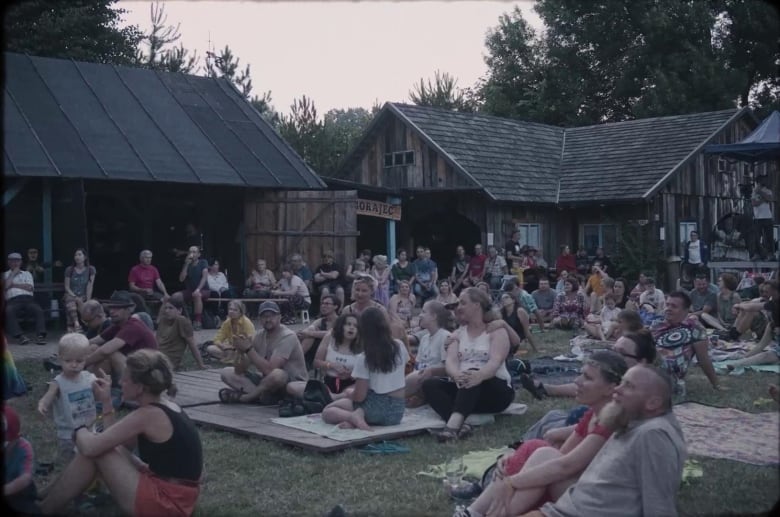A Polish folk festival became a lifeline for Ukrainians fleeing war — with help from Canadian musicians
Follow Montreal violinist Nadia Monczak as she visits relief efforts on the Polish/Ukrainian border
Folkowisko is a musical and cultural festival that typically takes place in July in the tiny Polish village of Gorajec on the Ukranian border. But when Russia invaded Ukraine earlier this year, the festival's organizers decided to use their organizational skills and pivot to providing humanitarian aid to both refugees in Poland and internally displaced people inside Ukraine.
In late March, Montreal violinist Nadia Monczak organized a benefit concert, Concert for Peace at the city's Notre-Dame Basilica, and donated the money to Folkowisko. In April, she went to Poland and Ukraine to see what the group was doing on the ground and to connect with fellow musicians in the Ukrainian city of Lviv.

The video above, by filmmaker Thomas Szacka-Marier, chronicles that journey. We talked to Szacka-Marier about the project.
How did you get involved with this project?
Nadia and I went to the same high school, so I've known her for quite a while, but it's not like we were close friends or anything. We caught up again and got to know each other better a few years ago. In 2018 I did another CBC Arts piece with her where she was spending some time in Greece, on the island of Lesbos. She was doing workshops with kids at the two refugee camps there, giving violin lessons and playing for the children. She reached out to me again this time because, with the war in Ukraine and her having a lot of Ukrainian friends, she organized this concert and she wanted to go and see what the organization for which she was raising all the money was doing on the ground, and she was planning to visit them. She asked me if I wanted to come and film.
So when you got to Poland, what struck you the most?
How much they got organized and how quickly they responded to the war and to the crisis. Folkowisko, they're really fascinating because they were not into humanitarian aid or anything before. They're just a bunch of friends who are organizing this folk music festival in the middle of nowhere. But since they had these skills and this ability to organize, as soon as the war started and the flow of refugees started crossing the border, their response was really, really quick.
They immediately set up some tents on both sides of the border. They found a warehouse that someone offered to them, and they started accumulating food and medicine and things that they started distributing. What struck me the most is how organized they were and also how quickly they could respond to the crisis compared to other bigger NGOs. They were there the first day. They were the first ones to respond.

Tell me about going to Ukraine. You weren't originally supposed to go, right?
What happened is that Nadia went to visit them like two weeks prior, before I went with her, and the guys there said most of their activities now have shifted toward Ukraine. There's not that many refugees crossing the border anymore, but there's a lot of internally displaced people that needed help on the other side. So she kind of prepared me for that; she said, "We might go, but if you're not comfortable, it's OK." I hesitated a little bit because I didn't know that much about the security situation on [the Ukrainian] side. I talked about it the night before with the people of the organization and they told me [about] the risks. And I told myself, "I can deal with that."
What was it like in Lviv?
What struck me there once we were in Lviv was how normal life seem to be in a way. Cafes, bars and restaurants were open. The streets were full of people. On the roads to get there, there's a number of checkpoints — people checking our IDs, piles of sandbags they use to block the road — and it's pretty striking to see. But in Lviv itself, life seemed pretty normal. I didn't expect that.
It's a really beautiful city. It has this feeling of, like, Budapest or Berlin. Life seemed to really just go on there. Obviously there's a lot of people still there and they live their life as normal as they can.




